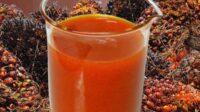PALMOILMAGAZINE, JAKARTA – PT Pupuk Kalimantan Timur (Pupuk Kaltim), together with Indonesia’s Ministry of Agriculture, has reaffirmed its commitment to securing the national fertilizer supply as a key foundation for achieving food self-sufficiency. The initiative aligns with the Asta Cita strategic agenda of President Prabowo Subianto and Vice President Gibran Rakabuming Raka.
The commitment was underscored during a forum hosted by the Agricultural Journalists Forum (Forwatan), themed “Ensuring Fertilizer Availability, Strengthening Food Self-Sufficiency”, held at the Ministry of Agriculture building in Jakarta on Tuesday (August 26).
Pupuk Kaltim President Director, Gusrizal, reported that as of the first half of 2025, production had reached 3.5 million tons—54.5 percent of the company’s annual target of 6.43 million tons. This includes 1.86 million tons of urea, 149,000 tons of NPK, and 1.49 million tons of ammonia. In terms of subsidized fertilizer distribution, 500,000 tons have already been delivered to Kalimantan, Sulawesi, and Nusa Tenggara.
Also Read: BPDP Backs Indonesia’s CPO Production Target of 60 Million Tons by 2030
“We are optimistic about meeting our 2025 production target. This is a tangible contribution from Pupuk Kaltim to support national food self-sufficiency,” said Gusrizal, quoted by beige-heron-208544.hostingersite.com.
From the government’s side, Sry Pujiati, Head of Subsidized Fertilizer at the Directorate General of Agricultural Infrastructure and Facilities, emphasized that subsidized fertilizer stocks are secure this year. A total of 9.55 million tons, valued at IDR 44 trillion, has been allocated to 14.9 million farmers. As of August 25, 2025, 4.8 million tons—or about 59 percent of the allocation—had already been distributed.
“Claims of fertilizer shortages are not accurate. The stock is available; distribution is just carried out in phases. The e-RDKK system is also being refined to ensure more transparent and targeted distribution,” she explained.
Still, challenges remain in the field. Zulharman Djusman, Deputy Secretary-General of KTNA (National Farmers and Fishermen Association), pointed out issues such as bureaucratic bottlenecks, limited agricultural extension workers, and restricted digital access in rural areas.
“e-RDKK socialization must be strengthened because many farmers still face difficulties due to limited technology and infrastructure,” Zulharman noted.
Meanwhile, Mochamad Nurhidayat, Head of the Substantive Group for Irrigated and Swamp Rice at the Ministry’s Directorate of Cereal Crops, stressed that boosting national food production also requires strategies such as land expansion, land optimization, the use of superior seeds, mechanization, and organic fertilizer utilization.
With synergy between the government, state-owned enterprises, and farmers, stakeholders remain optimistic that the goal of national food self-sufficiency can be achieved.
“The government is here to ensure fertilizer availability, increase production, and protect farmers,” Nurhidayat concluded. (P3)





































